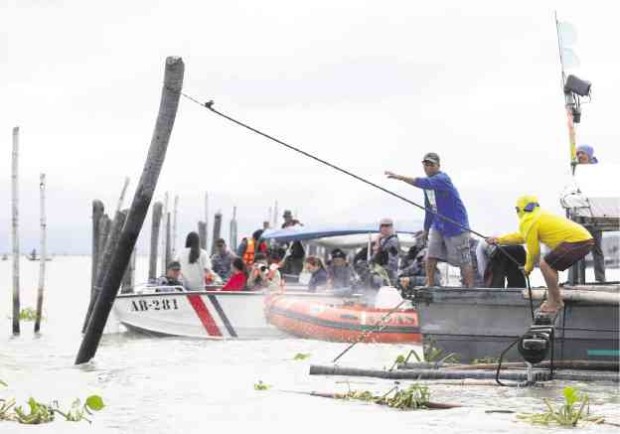
Small fishermen will regain access to their traditional fishing ground in Laguna de Bay once the government clears the lake of fish pens and other structures. —LYN RILLON
LOS BAÑOS, Laguna—A government team on Tuesday demolished two fish pens covering a total area of 70 hectares in Laguna de Bay as a new deadline for operators to harvest their stock and remove their structures from the lake looms.
Joined by more than 100 volunteers from civic and church groups, the National Anti-Environmental Crime Task Force dismantled a 51.49-ha fish pen owned by Seven Eleven Fishing Corp. and a 25-ha fish pen of Habagat Multipurpose Cooperative, both in Binangonan town in Rizal province.
Jaime Medina, general manager of the Laguna Lake Development Authority (LLDA), said Habagat’s pen was built early this month despite the suspension of construction of new structures in the lake.
In December, the LLDA and the Department of Environment and Natural Resources issued the moratorium following a directive from President Duterte to reduce the area occupied by commercial fish pens.
The agency has set March 31 as the new deadline for fish pen operators to harvest their stock.
Asked if this refers only to illegal and delinquent operators, Medina said, “As far as we’re concerned, no one was issued a clearance [to operate a fish pen] anymore.”
The LLDA, in January, did not renew the permits of more than 300 corporations. It also did not issue new licenses to fish pen operators.
He said operators were encouraged to demolish their structures as materials like anahaw leaves, bamboo poles, and fish nets recovered from the operation would be considered “sequestered.”
Interviewed by telephone from the lake on Tuesday, Medina said the government came up with a “different system” to make the clearing operations cost-efficient.
The government, he said, used to spend around P650,000 to demolish a 50-ha pen, hiring people on a daily rate.
Aware that a demolition may take months to finish, Medina said the LLDA contracted fishermen who would be paid on pakyawan (wholesale) basis or half the price of what the agency used to spend.
He said this system gave fishermen another source of income.
Commercial fish pen operators have opposed the government’s moratorium. They said the government ban would harm the country’s food
security by killing the industry that supplies 200,000 metric tons of bangus (milkfish) and tilapia annually.
But Medina said the demolition team would leave behind smaller structures or those covering 200 square meters or less owned by local fishermen.
“We are now in a paradigm shift (where) big fish pens will be gone and those left are fish traps of the smaller fishermen,” he said.